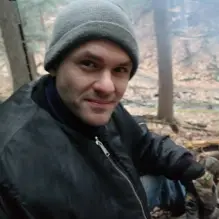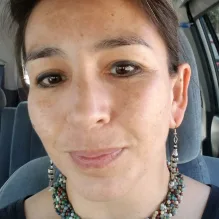
Dr. Kat Milligan-McClellan
Principal Investigator
Dr. Kat has broad expertise in microbiology, including both pathogenic and symbiotic microbes. As an undergrad and as a lab technician, she helped describe environmental and genetic factors that regulate toxin production in Staphylococcus aureus. For her PhD thesis she identified and characterized genes and their products necessary for an obligate intracellular parasite, Toxoplasma gondii, to establish infections in host brains. She expanded her exploration of host-microbe interactions during her postdoctoral training at the University of Oregon, where, working with a team of talented research associates, undergraduate students, and fellow postdoctoral fellows, she established stickleback as a model to examine how host genetic background contributes to host immune responses to intestinal microbiota. She was trained in host immune response to microbes, and examined how the host genetic background contributes to the ability of the host to shape the intestinal microbiota. During these studies, she built collaborations across two institutions and three universities, and mentored ten undergraduate and graduate students.
Dr. Kat’s long term mentoring goal is to combine the experiences she had as an Inupiaq earning a PhD and the expertise she gained in multiple research fields into a flourishing career as a mentor and professor to microbiologists. Kat was raised in a remote community above the Arctic Circle that was 80% Alaskan Native. She was the first person in her village to earn a PhD in biological sciences. While in school, she was struck by the scarcity of females and minorities in science. As a result, she is committed to making the academic research field a welcoming environment for minorities.
Dr. Kat is an active member in both scientific and Native communities. She taught Alaskan Native games to students and community members at the University of Wisconsin-Madison and the University of Oregon. At UW-Madison she was active in the American Indian Science and Engineering Society (AISES) and Wunk Sheek. At UO she was active in the Native American Strategies group, a group of faculty, staff and students that shaped Indigenous issues on campus. She worked extensively with the Diversity Director and the UO Native American community, staff, students and faculty to develop a new program for recruiting Alaska Natives and Native Americans (AN/NA) into science (Alaska Oregon Research Training Alliance, AORTA). She collaborated with Lane Community College in Eugene, Oregon to support an intense college preparation summer program (Bridge of the Gods Summer Academy, BOGSA). As an instructor for BOSGA, she taught Native American high school students Introduction to Microbiology for two weeks every summer to prepare them for the rigors of college and to show them that they can be successful in science classes. Dr. Kat continued to build relationships between the University of Oregon and the University of Alaska Anchorage, and between the UAA and the Alaskan Native/Native American community to recruit and support AN/NA students in science, technology, engineering and mathematical fields through ANSEP, Della Keats Health Sciences Summer Program, and UAA STEM day. Dr. Kat joined UConn in the midst of the pandemic, which has affected her ability to do outreach. However, she is active in the Native community on campus. She teaches a class on Historically Excluded and Underrepresented Scientists in the fall and Host Associated Microbes in the spring.
Dr. Kat’s Researchgate
Dr. Kat on twitter: @napaaqtuk
kat.milligan-mcclellan@uconn.edu
Graduate Students
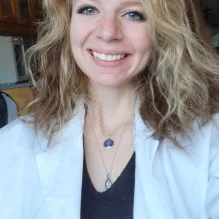
Kelly Crandall
Kelly Crandall earned a BS in Biochemistry at the University of Denver in 2017 and a BS in Biology and a concentration in biochemistry from the University of Colorado-Denver in 2020. Her previous work includes isolation, identification, and quantification. of proteins required for the development of African Clawed Frogs. Kelly’s thesis focused on two projects: identifying and analyzing the ability of the gut microbiota to degrade microplastics and protect the host from plastic toxicity, and the identification and classification of Archaea found within the gut microbiome of stickleback to determine their role in the host.
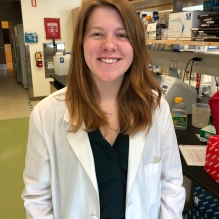
Kelly Ireland
Kelly identified and characterized PAH degrading microbes within the threespine stickleback gut microbiota and how they may help the fish respond to crude oil exposure. As an undergraduate, Kelly worked on developing qRT-PCR assays for innate and adaptive immune genes in stickleback. Kelly earned an Undergraduate Research Scholarship through the UAA Honors College, a Molly Ahlgren scholarship through the American Fisheries Society, and a Summer 2017 Alaska INBRE Undergraduate Research Assistantship (URA). She graduated with a double major in biology and journalism, with honors in each department, academic honors, and leadership honors from the University of Alaska Anchorage. She was funded by the Arctic Domain Awareness Center. She successfully defended her Master’s thesis May 2020 and is now a PhD student in Dr. Brandon Brigg’s lab at the University of Alaska Anchorage.

Ryan Lucas
Ryan focuses on understanding how host genetic background influences microbial community composition and immune response after exposure to clinically relevant levels of antibiotics, and whether stickleback from different genetic backgrounds select for different gut microbes. His work has been funded by an INBRE Graduate Research Fellowship. His teaching experience includes 2 years as a teaching assistant for Introduction to Microbiology for Health Science Majors, BIOL A240. He successfully defended his Master’s thesis May 2020.
Kenneth Sparks
As an undergraduate, Kenny worked with Dr. Emily Lescak and Ryan Lucas to develop stickleback artificial microbial communities based on antimicrobial resistant phenotypes to determine how microbial communities differ in response to antimicrobial challenge when exposed to antibiotics in vitro vs in vivo. Kenny earned an Undergraduate Research Scholarship through the UAA Honors College, and a Summer 2017 Alaska INBRE Undergraduate Research Assistantship. He was a Master’s student in Dr. Kat’s lab for a year before transferring to Dr. Jung’s lab to study the affects of circadian rhythms on host physiology.
Levi Wegner
Levi examined the diversity of MHCII genes and the correlation to the diversity of stickleback gut microbiota. Levi earned a Bachelor of Science degree in Biological Sciences with a minor in Russian from the University of Alaska Fairbanks. As an undergrad, he studied freeze tolerance in poplar trees. His research career includes working with the Alaska Department of Fish and Game to tag and sample salmon species, quantifying gold in ore samples, analyzing criminal report data, and assisting in analysis of autopsy and pathology samples. He was funded through the Sloan Foundation and is active in ANSEP. He completed his Masters degree in the lab of Dr. Brandon Briggs at the University of Alaska Anchorage.
Lab Technician
Postdoctoral Fellow
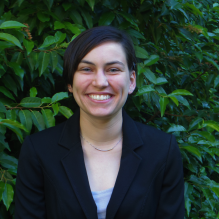
Nicole Kirchoff
Dr. Nicole Kirchoff (she/her) is a postdoctoral associate studying how the gut microbiome associates with vertebrate host behavior. She is also analyzing an ecotoxicological experiment to determine how herbicide use affects the gut microbiome of aquatic animals. During her PhD at Oregon State University, Dr. Kirchoff investigated environmental factors affecting the gut microbial composition of Pacific salmonids as well as associations between the gut microbiome of domestic dogs and dog aggression. In the future, Dr. Kirchoff hopes to apply her microbiome analysis skills to translation research while mentoring others in microbiome science.
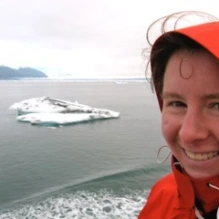
Emily Lescak 2015-2018
Emily Lescak’s research focused on how host genetic background and gut microbiota interact to influence development and behavior in the host. She received an NSF broadening participation postdoctoral fellowship to study the effects of exposure to environmentally-relevant levels of antibiotics on somatic, immune system, and behavioral development in stickleback. In her graduate work, she used behavior experiments, morphological analyses, and population genetics to address questions focused on the stability of phenotypic asymmetry and bimodality in wild populations, the role of predators in shaping prey phenotype, the rate of evolution in the wild, and co-evolution of the nuclear and mitochondrial genomes. She worked for Alaska Department of Fish and Game, and is now doing independent consulting work for various agencies.
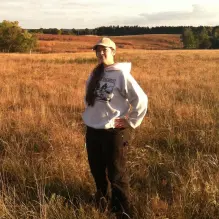
Amber Nashoba
Dr. Nashoba is interested in the application of evolutionary theory to understand and address environmental change. Her dissertation research studied population-level adaptation, natural selection, and the response to selection of a native prairie legume (Chamaecrista fasciculata). This project focused on the empirical application of Fisher’s Fundamental Theorem of Natural Selection and among-year environmental variation in the form of trait relationships, adaptive capacity, and fitness landscapes. She recently completed a Future Faculty Fellowship at the Northeastern University; during this time, she examined allele frequency change in drought and salinity associated genes in newly restored Spartina alterniflora in a Rhode Island salt marsh. Her Google Scholar page is here.
Research Associate

Sihan Bu
Sihan is a Research Associate/Postdoc in the lab working on the 16s libraries preparations on Kenai fish gut samples and microbial community analyses. She earned a Ph.D. in Human Nutrition from Michigan State University in 2023. She investigated the mediating role of infant gut microbiota in the relationship between infant feeding patterns and infant neurodevelopmental outcomes during her PhD study. Dr. Bu earned a M.S. in Human Nutrition from Michigan State University and a B.S. in Food Hygiene and Nutrition from Jilin Medical University, China.
Current Graduate Students
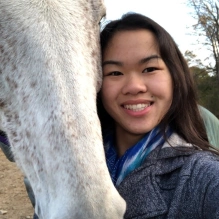
Sarah Pasqualetti
Sarah is investigating microbial interactions that can enhance or inhibit microplastic degrading abilities using microbes isolated from the gut of the three spine stickleback. Sarah earned her Bachelor’s of Science in Molecular and Cell Biology and a minor in Chemistry from the University of Connecticut. Before attending UConn, she worked with Essilor of America to develop polar laminates for eyeglasses by studying the color changes and integrity throughout the production process.
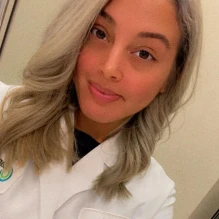
Liz Tirado
Liz earned her B.S. in Biology from Southern Connecticut State University in 2017. As part of a Microbiology course, she participated in the Small World Initiative where she grew her love for Microbiology. After graduation Liz has worked at a Microbiology lab for a Pharmaceutical company for the four years where she learned several techniques such as identifying bacteria/ yeast and mold by running PCR and Microsequencing, performing Mass Spectrometry, and several other skills. She is currently pursuing her M.S. in Molecular and Cell Biology with a concentration in Microbiology where her thesis is focusing on how exposure to Perchlorate changes the host microbiome in three spine sticklebacks.
Undergraduate Students
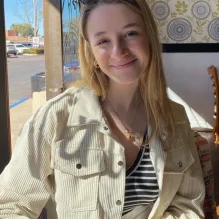
Kayleigh O'Keefe
Kayleigh is currently an undergraduate at UConn, pursuing a double-major degree in Molecular and Cell Biology combined with Sociology. She is planning to graduate in 2024, after which she would like to potentially enter the dental field. As she continues her undergraduate degree, she hopes to investigate correlations between sociology and cell biology within her research.
